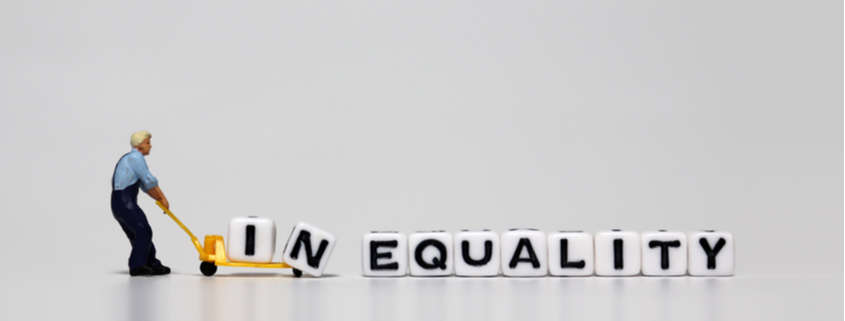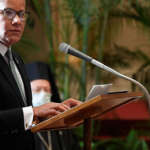Presidential Address to the Oxford Diocesan Synod on Saturday 13 November by the Rt Revd Dr Steven Croft, Bishop of Oxford.
Inequality
Nine years ago in 2012, I found myself riding the Number 83 bus across Sheffield with a BBC news crew. The occasion was the launch of the report of the Sheffield Fairness Commission which examined inequalities across the city. I was a member of the Commission with 22 others drawn from every part of the city. Our brief was to look at Sheffield through the lens of inequality, apply that lens to health, housing, jobs, transport and income and make recommendations to Sheffield City Council.
Sheffield is a starkly segmented city for historical reasons. One of the findings of the Fairness Commission was the differences in life expectancy along the number 83 bus route: 8.7 years for men and 7.4 years for women. The camera crew who were with me asked the passengers on the bus their reaction to the news that life expectancy dropped the nearer the bus came to the city centre. What did they think? “I’d think it was time to get off the bus”, said one man with a dry Yorkshire wit. Sadly his comment never made it to the bulletin.
The Sheffield Fairness Commission is one of a number of pieces of work which look at the questions of poverty through the lens of inequality and fairness. Later in this Synod, Stephen Pullin, the Archdeacon of Berkshire, and Hannah Ling will lead us in a debate on our new report, Addressing Poverty and Inequality which stands in a similar tradition: poverty must be understood through a complex series of lenses. One of the most important and far reaching factors in the health of a society are the levels of inequality: the gap between the richest and the poorest members of a society. The more equal and fair a society, the better for the health and well being of all.
Most of these studies build and pay tribute to the groundbreaking study by Richard Wilkinson and Kate Pickett, published in 2009, The Spirit Level: Why more equal societies almost always do better. The book is based on more than 30 years of research across many different countries. It demonstrates that more unequal societies are bad for almost everyone: the well off as well as the poor. The authors followed up their 2009 study with a second book, published in 2018: The Inner Level: how more equal societies reduce stress, restore sanity and improve everyone’s well being.
I’ve revisited the Sheffield Fairness Commission and The Spirit Level this week in preparation for this Synod and the launch of our own report on Poverty and Inequality. One of the many consequences of the COVID pandemic is the exaggeration of inequality, the widening of the gap between poor and rich.
Listen again to the BBC’s Emily Maitliss, introducing Newsnight on 9th April last year, in the midst of lockdown with no vaccine in sight.
The same picture is reinforced in the report we launch today, which looks specifically at the disproportionate impact of COVID on the poorest members of the communities we serve as well as at the remarkable response of churches across the Diocese.
The concept of fairness runs through the scriptures like a watermark. Many of us will have been reading the early chapters of Isaiah in morning prayer this week. Inequality is rife.
“The Lord enters into judgement with the elders and princes of his people. It is you who have devoured the vineyard; the spoil of the poor is in your houses. What do you mean by crushing my people, by grinding the face of the poor, says the Lord God of hosts” (3.14-14)
“Ah, you who join house to house, who add field to field, until there is room for no-one but you and you are left to live alone in the midst of the land” (5.8)
The poor cannot be isolated and considered apart from the rich. Both most be seen together. To reflect on poverty is also to reflect on wealth and inequality.
The opening verses of the story of the rich man and Lazarus underline at every point the gap between rich and poor.
“There was a rich man who was dressed in purple and fine linen and who feasted sumptuously every day. At his gate lay a poor man named Lazarus, covered with sores, who longed to satisfy his hunger with what fell from the rich man’s table; even the dogs would come and lick his sores”.
The rich man is distinguished by his beautiful clothes which proclaim his status. He consumes far more than his daily bread. Every day he enjoys a sumptuous, brilliant feast. His life is full of parties. He has a house so fine it has a gate to separate him from the less well off. His leftovers would be sufficient to feed those who gather there but very few crumbs fall from his table.
Lazarus is given the dignity of a name by Jesus but he is given little else. He has nothing. He begs at the gate for crumbs. His health suffers. The fact that the dogs lick his sores make him ritually unclean and outside the community. The poverty of Lazarus and the excess of the rich man both lead to premature death. It is the inequality which is the scandal.
We will have many inequalities in our mind as we gather for this first Synod of the new triennium. Bishop Olivia has just returned from two weeks in Glasgow at COP 26. Last Saturday I joined 3000 climate protestors gathered in central Oxford. The cry on the streets was for climate justice: not only for an end to global warming but for a just settlement for the earth’s poorest nations. Global warming of around two degrees will widen the inequality gaps globally and lead to a massive, massive increase in refugees and displaced peoples.
We will want to consider the inequalities of wealth, race, gender or sexuality within our own Diocese of Oxford and all that our parishes are doing to love and support the poorest in our communities through a wide range of social action projects. We will note the many different ways in which that action has widened and deepened through the pandemic. We will give thanks for exemplary community service and also for our attempts to increase advocacy for the poor through our embryonic partnership with Citizens UK and in other ways.
We will want to give thanks for and consider the work of our schools which we have because of the commitment of previous generations to combat inequalities through the education of the poorest in society and which continues still today.
We will want to consider the ways in which we support one another as parishes as we review our parish share scheme in the coming years and as we consider our diocesan budgets. We will want to consider, with the General Synod this week, the way in which dioceses which are differently resourced can offer one another greater and deeper mutual support. The report on this has been prepared and is being presented by my successor in Sheffield, Bishop Pete Wilcox. The paper highlights the relative wealth of the Diocese of Oxford in terms of our own endowment. This is another gap which has become too wide and which we have begun to bridge with our gift of £1 million over four years to be distributed to the five least wealthy dioceses.
In many different ways, the concepts of fairness, of justice, of inequality will shape public debate and church life over the coming decade. The government has articulated a strong desire to level up the national economy so that wealth is no longer concentrated to such a degree in the South East of England. A second debate at General Synod on Tuesday brought by the Diocese of Leeds will focus on these disparities of wealth and poverty nationally.
But I return for my final point to the experience of launching the fairness commission report in Sheffield in 2012. One of the things I learned was that the concept of justice, of fairness, can no longer be taken for granted in society as it now is in the United Kingdom. As Tom Holland and others have recently argued, so much of what our society assumes about its common secular values is derived from our country’s Christian heritage. The Church has a vital role in keeping that heritage alive and real, of making the case for justice and fairness in our common life and especially in the coming decade.
The questions of poverty and inequality which we will explore this morning are at the heart of our discipleship. As individuals each of us will need to navigate the spiritual challenges, dangers and temptations of relative and sometimes actual wealth. As a church we have a calling to serve the poorest in our communities and also to steward our own wealth guided by values of justice and compassion. As a whole church we have a responsibility to maintain and if we can to deepen the way in which our society lives out the call in the prophets and in the gospels to justice and a fairer society.
May the God of Isaiah, of Amos, of Micah give us in our generation grace to work for the coming of God’s kingdom.
+Steven
13 November 2021
- The Addressing Poverty & Inequality report will be published by the diocese at oxford.anglican.org/poverty-inequality week commencing 15 November



